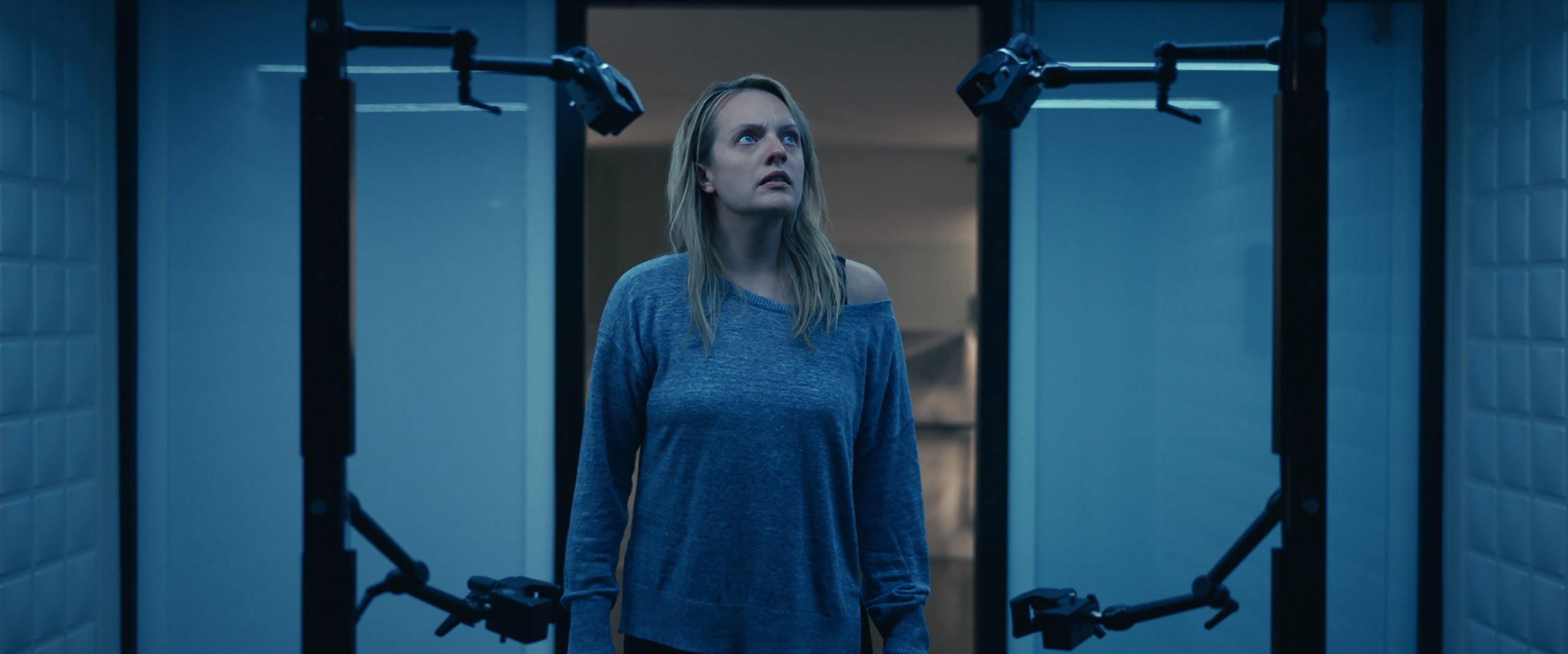Now THIS is a great literary adaptation. H.G. Wells thought of the great premise: what if someone was invisible to the naked eye? Now, there have been adaptations of The Invisible Man since movies existed: some of those imagining the terror capability of the power of invisibility. But we had to wait until 2020 for Leigh Whannell and Elisabeth Moss to crack the code, giving us a simultaneously timely and timeless tale of terror that many, especially women, will find all too relatable.
After a particularly harrowing night, Cecilia Ross (Elisabeth Moss) summons the courage and wit to escape her clearly cruel boyfriend, Adrian Griffin (Oliver Jackson -Cohen). She stays with friend James Lanier (Aldis Hodge) and his daughter Sydney (Storm Reid), in close proximity to her sister Emily (Harriet Dyer). 2 weeks later she gets some great news from Adrian’s brother Tom (Michael Dorman): Adrian has killed himself, and left Cecilia $5 Million dollars, provided she doesn’t get arrested or get declared mentally incompetent. While everyone celebrates, Cecilia is skeptical, since suicide would be out of Adrian’s character. Her suspicions, obviously, become horrifyingly true as strange strategically cruel events start happening around Cecilia and the people she cares about.
Leigh Whannell layers in all sorts of thematic poignancy into his Invisible Man to give the story elevated levels of potency. First and foremost, the dude clearly researched how manipulative abusive relationships manifest themselves. Adrian, invisible or not, is portrayed as someone who loves to completely control someone. How do you do that? First, you isolate that person, which Adrian does with horrific precision. The people close to Cecilia start to question her, which erases any confidence the poor woman had and ups her perceived paranoia. Adrian’s manipulation forces Cecilia to try to stop Adrian without any support from loved ones, or even society’s safety measures like police or therapists, because the world now thinks she’s crazy. Now go one layer deeper: Cecilia starts to develop PTSD from this experience, unable to sleep and living in perpetual fear. More heartbreaking, she starts thinking she is the actual person to blame for all these cruel acts that Adrian is perpetrating. Go even deeper: Roger Ailes. Harvey Weinstein. Bill Cosby. Adrian Griffin. All these powerful men get away with their cruelty by using the systems in place to remain invisible: it’s only just in Griffin’s case that it’s literal. And what happens when people like Cecilia don’t stay silent? They get ostracized and punished; Cecilia’s justified paranoia threatens the inheritance due her because she’s breaking society’s rules. All credit to Leigh Whannell, who clearly thought this through, and Elisabeth Moss, who embodies this depth and resonance with her riveting portrayal of an abuse victim who decides enough is enough, F everybody else, I got this!
But as we all know, none of this works if The Invisible Man doesn’t entertain like hell out of its audience. Thankfully, from minute one, this movie is Adrian Griffin, keeping you pinned to your seat, unable to move. Minute one starts with Cecilia’s escape from visible Adrian, working much in the way A Quiet Place did. I was holding my breath FOR Cecilia so she didn’t have to. That gripping fear never leaves for the next two hours, as Whannell’s script and Moss’s performance show how empty chairs, doorways, and empty rooms can somehow be more terrifying, using that Jaws maneuver of not revealing and making us as paranoid as Cecilia is. As the story goes along, the movie packs in all sorts of twists and turns. I openly gasped at least 2-3 times. In addition, the plot instills changes within Cecilia, as we see she’s gonna choose fight in the “fight or flight” ultimatum a survivor experiences. The big pitfall of horror movies like these is that characters make stupid choices for no reason to further the plot, and for the most part, The Invisible Man avoids that level of incredulity, with not only Cecilia but Adrian engaged in a high level game of terror chess.
Don’t know why, but February time frame has seen the release of some really great horror movies. Get Out. Happy Death Day 2U. The Witch. Just to name a few. The Invisible Man is right up there with them, tapping into that thing that horror movies are so good at: entertaining us while allegorically pointing a lens at something really important. Props to Leigh Whannell, Elisabeth Moss, and all those brave people dealing with their own invisible men in their lives.

